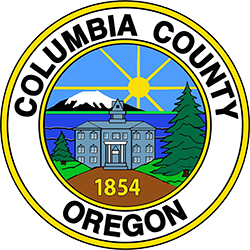Assessment and Taxation FAQs
A Confidential Personal Property Return is used to list all taxable personal property which you own, posses, or control in the operation of your business. Oregon Revised Statute (ORS) 308.290 requires every business owning taxable personal property to file an annual return with the assessor of the county in which the property is located.
No, House Bill 2484 passed by the Legislature in 2015 changed the filing due date from March 1 to March 15 and eliminated the ability to request an extension. All returns that are filed late receive a penalty. The penalty is a percentage of the taxes and is 5%, 25%, or 50% depending on how late the return is filed.
No, they are taxed using the same rates as real property based on the location (tax code area) of the property.
Record a document deeding the property from your former name to your new name.
If you want to remove her name, you need to provide us with a copy of the Circuit Court document or other legal document that granted the property to you.
The death certificate must be recorded with the County Clerk. Complete a Request for Change of Assessor's Records form. If the death certificate was recorded in a county other than Columbia County, attach a copy of the death certificate to the request form.
Yes, as long as the properties are on the same tax lot map, share a common border, the name of the buyer listed on both deeds is exactly the same and all the real property taxes on both tax lots have been paid. If there is a taxing district boundary line passing through your property, even though the Assessor combines the two tax lots, you will get two tax statements because the taxes may be calculated using different tax rates. Complete a "Request to Segregate or Combine Tax Lot(s)" form.
Yes, the special assessment is attached to the land and the potential tax liability is transferred to the buyer at the time of the sale.
No, we do not currently have the staffing and resources to calculate the potential tax liability unless it is actually being disqualified. You can, however, calculate a rough estimate by using the Special Assessment Disqualification Estimate Worksheet.
It is the current landowner's responsibility to obtain income information. You may need to contact your realtor or the seller to assist you in filling out the questionnaire.
If you are farming, the land will be assessed at market value and the disqualification tax will be "abated". This means that for each year you farm the property, one year of the additional tax is forgiven and after five years there is no additional tax remaining. If you meet the income requirements for 3 out of the last 5 years, you may reapply for the special assessment. If you do not farm the property, the disqualification tax amount will remain as a lien but will not be added to the tax statement unless the land changes to a use in which it could not be returned to farming.
Yes, although properties that are zoned exclusive farm use do not require an application and are not required to meet minimum income requirements like non-EFU zoned properties are, there still must by farming activity taking place to qualify for the special assessment. You must be using the property "exclusively for farm use" in order to qualify.
Oregon Revised Statute 308A.056 gives a comprehensive definition of "farm use". In part it entails "...the current employment of land for the primary purpose obtaining a profit in money". In other words you have to be actively farming the property and attempting to make money from it. One cow on 100 acres is not enough to qualify. If the land does not qualify it can be disqualified from farm use assessment and assessed at the property's full market value.
Land that has been logged must be replanted within two years and must meet the minimum stocking requirements as set by the state forester. You need to submit a forest management plan with your application.
A forest management plan explains how the land is being maintained for the best growth of the trees such as clearing brush, spraying weeds, etc. if the parcel has been logged, the plan must also include the month and year it will be planted and the type of seedlings that will be used.
ORS Chapter 92 are the statutes governing the creation of subdivisions and partition plats.
You first need to contact the Assessor of the county in which the home is located. All taxes must be current. We can process the application for you as long as the information submitted is complete. If you want to process your application online through BCD, you must first obtain a signed county notification certificate.
We have found that manufactured homes will increase or decrease in value depending on the current real estate market. We collect data on sales of manufactured homes every year and compare the sales prices to the current real market value. Manufactured structure values are then adjusted annually based on the sales analysis.
Oregon Revised Statute (ORS) 308.232 requires the assessor to appraise each piece of property at 100 percent of the real market value as of the assessment date (January 1 preceding mailing the tax statement). However, with over 28,000 accounts it would be impossible to accurately appraise each property every year. Typically, an appraised value can be five percent high or low and still be considered accurate. While our values are as accurate as possible and should provide some indication of what your property would sell for, a better indicator would be to hire an independent fee appraiser.
You should definitely call the assessor's office. While there may be a good reason why you are not being taxed on the new home, if it was a mistake, regardless of whose mistake it was, when it is eventually discovered, the assessor can go back six years to correct the mistake and collect back taxes for each of those years. It is better to pay the correct amount each year than to pay six years worth of taxes all at one time.
It is all a matter of timing. When you get the tax statement in October, the value is based on the previous January 1. If you did not start the new home until February, 2019 you would not pay taxes on it until you got your tax statement in October, 2020.
A variety of factors come into play and because of the complexities of Oregon's property tax system, there is no short answer to your question. An appraiser that has been registered with the State of Oregon will visit your property and a determination of the additional market value will be calculated. This additional value will be computed based on proven and accepted professional mass appraisal methods. After the market value of your addition has been measured, your tax liability will be determined according to Oregon Revised Statutes.
If your property fronts a county road, county "public way", city street (whether the city is incorporated or not) or subdivision street and the road or street is actually used as a public right of way, the answer is no.
If your property fronts a "private drive" that is used by several property owners or an unincorporated city street that is not used as a street, then the area of property that you own within the road or street would be taxable to you.
No, we do not have the staffing resources to set appointments. During reappraisal, each appraiser may inspect and appraise an average of 50 properties per week. If they determine that they need to talk to the owner for more information, they will leave a door hanger on the front door requesting contact.
No, if you ask the appraiser to leave, he or she will leave the boundaries of your property. However, any changes to your property will need to be estimated from the public roadway or from information provided on permits or other means such as aerial photos in order to meet our legal requirement to appraise all properties at 100% real market value.
No, if the appraiser is completing a reappraisal and no changes are visible, he or she may enter as far as the front door to see if anyone is home. If there is no answer, a door hanger may be left asking you to call. If changes to the property are visible, we will measure and inspect the new improvements in order to meet our legal requirement to appraise all property at 100% real market value.
Property Records Online
By clicking on either of the links below, you agree to our DISCLAIMER.



